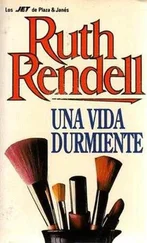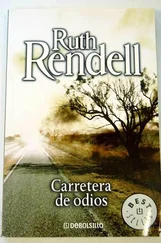Arthur went back there because he had nowhere else to go. No police car, no policeman in the hall. He stood in the hall, listening, wondering if they were up there on the top landing. A door above him crashed for all the world as if Jonathan Dean were back. And he was. Arthur stared. Jonathan Dean was coming downstairs with that black man and Anthony Johnson.
He managed to say good evening. Winston Mervyn said good evening back, but Jonathan Dean said nothing. He was drunk perhaps. He looked drunk, leaning on Mervyn’s arm, his face grey and puffy. They went out into the street. Anthony Johnson said, “I’ll be with you in a minute,” and turned away to the hall table where he began sifting through the heap of letters Arthur hadn’t felt capable of arranging methodically that morning. Arthur couldn’t leave him to it and go upstairs. He edged along the hall almost shyly, but his heart was pounding with terror.
Anthony Johnson was looking annoyed. He said rather absently to Arthur, “An awful thing, this murder.”
Arthur found a voice, a husky weak voice that came from somewhere in the back of his neck. “Have the police—have they interviewed you?”
And now Anthony Johnson turned round to face him, his blue eyes very penetrating. “No, they haven’t, oddly enough. I’m surprised, because I do have things to tell them.”
“I see.” Arthur could hear his own voice as strange, as throaty. “Will you—will you go and tell them off your own bat, as it were?”
“I shouldn’t think so. They can come to me if they want me. I don’t see myself as the instrument of justice or the means of shutting a man up for life. Except, maybe, in very special circumstances. I mean, if an injury were done to me or mine, for instance.”
Arthur nodded. Relief caused sweat to break over him, flushing him with heat. Anthony Johnson’s meaning was unmistakable, hardly veiled, and as if to reinforce it, as Arthur began to walk away, he called:
“Mr. Johnson?”
“Yes?”
“I’ve been meaning to thank you for that note you left me. It was weeks ago but we don’t seem to have met since. You remember? When you opened my letter by mistake?”
“Yes.”
“It was thoughtful of you to leave that note.” Anthony Johnson’s voice was very gentle now, very considerate. Was he imagining the hint of menace that underlay it or was that menace really there? “I wouldn’t like you to think I’d bear a grudge. It wasn’t as if it was a very personal letter.”
“Oh no,” Arthur stammered. “No, indeed. A personal letter-that would be a dreadful intrusion.” He cleared his throat. “An injury,” he said.
15
————
Brian Kotowsky was the only son of Polish Jews, now dead, who had emigrated to this country in the nineteen thirties. Stanley Caspian told Arthur that Jonathan Dean and Vesta’s brother were the only close associates Brian had had, and they had been, therefore, closely questioned by the police as to his possible hiding place. The brother-in-law remembered hearing of an aunt of Brian’s, his mother’s sister, who lived in Brighton, but when the police went to her house they found that she had been in hospital for a minor operation since the day before Vesta’s death.
“I don’t know.” By this Arthur meant he didn’t know how Stanley could know so much. Some grass-roots system, perhaps, that had often proved reliable in the past.
“He’ll have skipped off to South America,” said Stanley, jabbing full stops into Li-li Chan’s rent book. “They must have had a fortune stashed away, him and her, considering they were both working and not paying me more than a poxy fourteen quid a week for that flat.”
“Two rooms,” said Arthur absently.
“A two-roomed flat with fridge and immersion heater. Cheap at the price. Put the kettle on, me old Arthur. Mrs. Caspian’s sister’s mother-in-law’s got a pal who knows a chap that keeps a paper shop up West Hampstead, West End Lane, and he told the pal he’d been helping the police in their enquiries on account of Kotowsky going in there Wednesday morning to get some fags and a paper. Identified him, this paper-shop chap did, from photos. And he’s the last living soul to have set eyes on him. Have a bit of pie?”
“No, thank you,” said Arthur.
“God knows what he was doing in Hampstead. It’s more than I can understand, a chap killing his own wife, me and Mrs. Caspian having been a pair of real lovebirds all our married life. A cream passionate is what they call it. Thank God it wasn’t under my roof. There’s nothing like that to give a place a bad name. What’s worrying me is when I’ll be able to relet the flat. I can’t afford to take a drop in my income at this juncture, I can tell you.”
“I shouldn’t wonder,” said Arthur with malice, “if the authorities don’t seal it up for months and months. And now, if I might have my little envelope?”
In his pocket was another, mauve-grey, postmarked Bristol, which he had picked up from the doormat ten minutes before. Who could have suspected that she would write again, having been turned down, or apparently turned down, and send a letter to arrive on a Saturday? However, because Stanley Caspian was already parking his car at the kerb, he had snatched it up. Now he wondered why, for he intended no further revenge on Anthony Johnson. Far from it. Just as Anthony Johnson had forgiven him for opening that letter from the council, so he would forgive Anthony Johnson for that act of destruction by fire. Must forgive him, because now he was entirely in Anthony Johnson’s power.
Dropping the Bristol letter on his kitchen table, Arthur forced himself to think clearly. Anthony Johnson had said plainly that he wouldn’t pardon the theft of a personal letter. No letter could be more personal than last Tuesday’s. Therefore, he must never know that Arthur had taken it. He would surely go to the police and tell what he had seen if he suspected Arthur of interfering with his correspondence. So Anthony Johnson must have this letter. But what if H. mentioned in it that she had written before? Arthur plugged in his electric kettle. The envelope flap reacted obediently to the jet of steam and curled easily away. With extreme care, he took out the sheet of flimsy.
Darling Tony, Why haven’t I heard from you? I couldn’t believe it when the post brought me nothing from you. Letters don’t go astray, do they? But the alternative is that you didn’t want to write, that you’re angry with me, making me wait now as I made you wait in the past. Or is it that you need time to think in, to make plans for where we shall live and so on? I see you may need time to adjust to a new life and disrupt the new one you have already made. But if you need weeks, if you want to wait till your term ends, can’t you understand that I’ll understand? I’m so entirely yours now, Tony, that I’ll do anything you ask. Only don’t let me endure suspense, don’t leave me in fear .
But there isn’t any real need to be frightened, is there? I know you’ll write. Is it possible that someone living in your house would take your letters by mistake. Surely, no one who did that would keep a letter like mine, a true love letter. And yet I hope and hope this is what happened. Or that this murder in your street I’ve read about in the newspapers has somehow made the police take people’s post .
Because I have to believe you didn’t get my letter, I’ll repeat what I said in it, that I’ll leave Roger and come to you whenever you like. Your most devoted and loving, H .
Arthur read it several times. He wondered at the emotion conveyed in it. Strange that anyone could put such exaggerations, such drama, on paper. But her guesswork was correct. Her previous letter had been purloined by someone living in the house, and therefore Anthony Johnson must no more receive this one than he had received the last. He must never be allowed to receive any letter in a mauve-grey envelope, postmarked Bristol.…
Читать дальше











